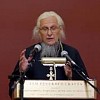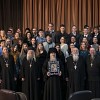In other words, saying precisely when our lives will return to normal is very difficult. Like, on the other hand, answering the question will that life essentially be normal, i.e. as before. But we might, and I believe we should, take a different approach. That is to say we should try to understand the effect this ordeal has had on our thinking and what we have learned from it. Or otherwise on what should we have reflected and what should we have learned. Or still alternatively what insight can we obtain from it, how can our minds become enriched, disregarding the tragedy and incredible complexity of what has occurred.
I will attempt to share what I have come to understand.
1. It seems to me that it is worth placing first the obvious necessity of being prepared for anything in life. We often feel that there is a host of things that will never happen to us in life, and consequently we find ourselves unprepared when they actually occur. I am not alleging that it is possible to be entirely, fully prepared “for anything” regarding technical or material matters. One would hardly find oneself having to acquire beforehand a satisfactory quantity of protective clothing, masks or antiseptics in case of a new epidemic (not to speak of a sizeable bank account, which would allow enduring an extended period of unemployment without problems). And not everyone can keep an inflatable lifeboat in case of a flood. And also, a portable parachute in case of being trapped by a fire in a shopping mall would be a life-saving device far from anyone’s mind. Nevertheless, in my opinion there is something far more important: a clear understanding of the fact, that in the world in its current situation anything can happen, and in such a case it is necessary to behave courageously and soberly, not losing self-control, not panicking and, of course, not despairing and not murmuring against God.
- A comprehensive realization of the first point is possible when a person trusts in his Creator and God with all his heart, strives to arrive at an inner disposition, from out of which a holy elder once said, “Even if heaven should bend to the earth, my mind will not be shaken.” Complete trust in God is equal to the ability at the command of Christ to walk on water to Him, believing that no harm will come to you. And even if something harmful in the eyes of the world should occur, the Lord will turn it to your benefit; since trust, in the words of the Venerable Elder Paisios of Mount Athos, is a type of constant prayer, uniting a man to God. And for those who are united to Him nothing in reality is terrifying.
- This being said it necessarily follows that understanding that trust in God does not in the least propose a complete lack of consideration of the requirements of common sense and the norms of safety. Being sensible and careful is a Christian duty, all the more so if we are speaking not only of life and health, but also of the fate of those near to us. About that much has been said, and even more will surely be said when the struggle with the epidemic has ended, and time will come for review and working on errors. It is very difficult to serve in a church where there are no parishioners, when in place of a sea of human faces you see before yourself, as you say “Peace be unto all,” only a pair of singers and a video camera lens, reminding you that the service is being live-streamed. But I am certain that that is easier than serving the funeral of an elderly (or perhaps not elderly) parishioner, understanding that they could have been infected in this very church, and you cannot help feeling responsible. And if at the beginning, honestly speaking, the danger seemed insubstantial, in a short space of time the number of cases from Moscow, and also from other regions, easily convinced me otherwise. True, corona virus is not smallpox, but in the circumstances of a general unpreparedness for a pandemic, with physicians incredibly overworked, with a persistent insufficiency of everything possible in places, people are dying. And how can we not reckon with this fact?
- It is no better to deny the danger of the corona virus, to panic and live in unending fear. Not to mention that fear is the most glaring sign of the absence of that trust in God, discussed above, that deprives a person of the capacity to think clearly, gives rise to many errors, incoherency and therefore far from harmless actions. And, of course, it lowers immunity and undermines bodily defenses. That is self-evident.
- The majority of us, to quite a significant degree, have suffered from the economic crisis, which is following the pandemic like a shadow. Some have completely lost their jobs. Some have suffered the loss of a part of their pay. Some have experienced difficulties with inability in fulfilling financial and other obligations. For many these times have become a life lesson in penury, life with a significant limitation of essential needs. Some will have to survive in the full sense of that word, and some have received a chance to learn what they had not previously known – thrift and discretion. And God grant that that thrift allows us not only to wisely manage our resources, but also to help those who have none at all. It seems to me that this also is one of the most important lessons: the realization of such a necessity and the understanding that as much as we are squeezed by necessity and are able to refrain from non-essential spending, so can we support those whose needs are greater than ours.
- At the time when we day after day wake up hoping that all that happened was a nightmare and has ended at last, when we actually understand how little in fact depends on us, it seems to me the best time to truly begin anew, not as you go, not out of duty, not as a mere formality, but actually and seriously to pray. For a significant part of us the time for this has come. And for virtually everyone – concern for relatives and those near to us, for those who might become ill and for those who are already ill. And furthermore – the understanding that in general in our life, more precisely, practically nothing rises up to the level of what we have experienced. And there is nothing more natural than seeking an escape from and a resolution of all this overwhelming anxiety and anguish in prayer. And it would be a great mistake not to do so.
- And also now, without any doubt, the time has come for us to understand what in the Church and in Christianity is principal and what is secondary. To understand that not kissing the Cross or the priest’s right hand or even the necessity of staying home and thus not receiving communion for a while can of themselves distance us from Christ. We distance ourselves from Him only if our faith flickers faintly in us, if it has no basis other than the prevailing order of church life, other than for us its customary setup. The Christian life is to believe in Christ, to desire with all one’s heart to be with Him, to learn to live according to His commandments and to flourish in love for God and neighbor. In saying this I am in no way diminishing the place of the Church in our life. No, it is about something else: circumstances independent of our will and preventing us from attending church regularly should not deprive us of the assurance that as before we remain her children. And we do remain so if for us Christ is foremost always and in any situation. That is what is truly important, most important of all.
- We, of course, now see yet again what we have seen many times before: to one and the same problem in the Church there can be completely different attitudes. We have seen it. But now the problem is quite acute and painful. And it is obligingly necessary to clear up for ourselves, that those in church who think not as we do must not be treated as enemies. We have no reason or right as Christians to do so. And, as a rule, enmity begets a much greater harm than a difference of opinion, thanks to which, according to the Apostle Paul, the most skillful should be revealed.
- At present we all have unwillingly encountered various difficulties and trials, of both a mutual and personal order. We have encountered, in other words, that which we usually try to avoid with all our might. And it is the very time to remember that difficulty and trials are a natural component of the Christian life, and more importantly they are an essential condition for its maturation and inner growth, much like the virtues of humility and patience, without which no one can in any way flourish. And the current situation is precisely ideal for perfecting them.
- In general then the break up of our accustomed mode of life, however painful it might have been, is a unique lesson, an opportunity to understand how much we depend on that which we consider “our own” life, and conversely to what extent we may be freed from its habitual provisions. Draw a mandatory boundary between yourself and this break up, determine where it ends with its limitations and where we begin, what is left, so to speak, in a sober or some other reckoning. In other words, realize who we actually are.
Igumen NEKTARY (Morozov)
Saratov, Russia
Source of Russian text: www.pravmir.ru
Translated from the Russian by Reader Stephen (Robert) Parent,
Choir Director of Holy Trinity Cathedral (OCA) in San Francisco, California
SOURCE: sfsobor.com
|
| |||||||||||||












